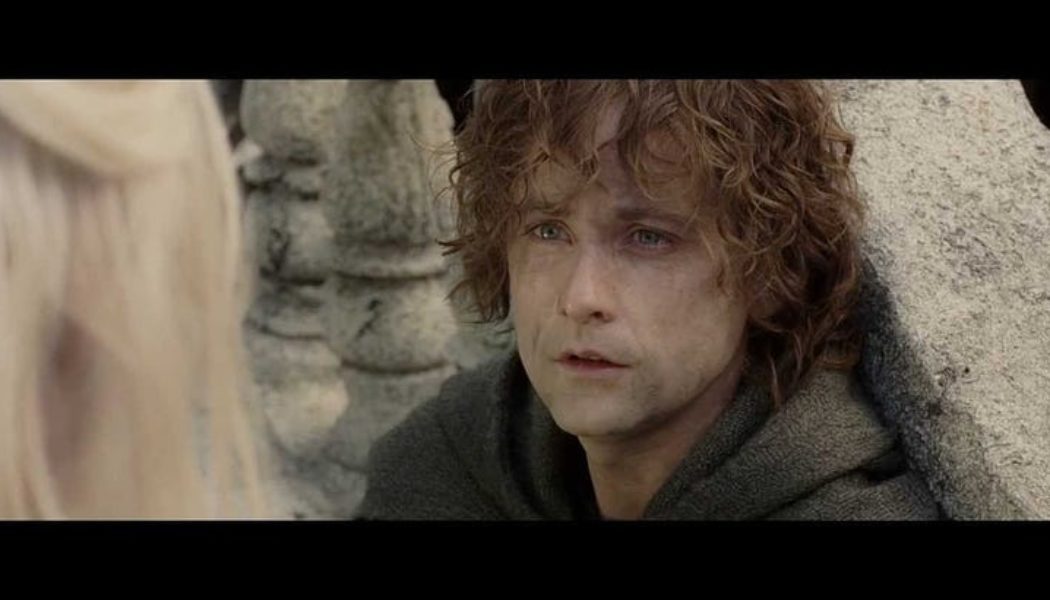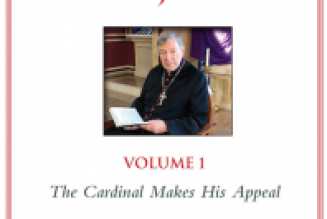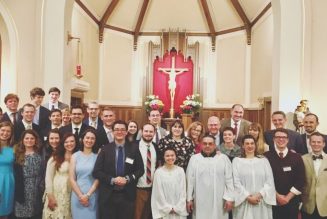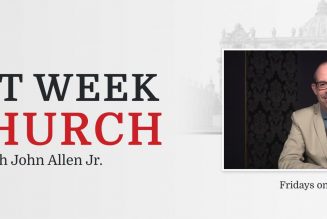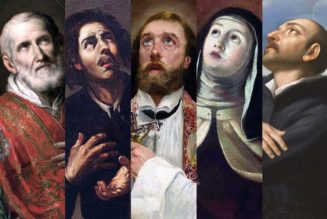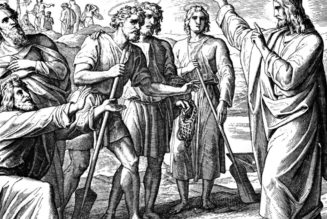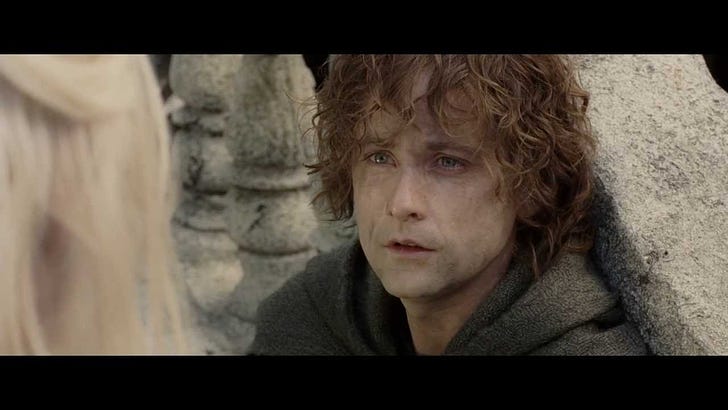
Did anyone head to a multiplex to see the (extended) “Lord of the Rings” trilogy on real movie screens (or what passes for them these days)?
Yes, it took time and money to do this. Why go see movies with other people in a theater? After all, people are really busy, even as statistics keep rising showing how much time we dedicate to the more convenient, solitary, even hidden screens that dominate modern life.
The Mattinglys of Oak Ridge went to a local theater with one or two friends — hardcore movie lovers — and tried to rally others. Part of the problem was that the calendar window to see the trilogy was so small. I thought that each of the LOTR epics would be in theaters for a full week, giving us most of June to see them. A Saturday-Sunday-Monday blitz made it harder to take part.
A few things really hit home for me, while watching LOTR on theater screens again. Ironically, the scenes that impressed me the most focused on FACES, not big battles and spectacular vistas. At crucial moments, what really mattered were the words J.R.R. Tolkien crafted to describe the trials and temptations faced by his characters.
Consider this hushed moment after all the wild fighting at the end of “The Fellowship of the Ring.”
OK, Hollywood screenwriters — try and fake that.
Here is another example of what I am talking about, from that same film. Want to see a strong female character wrestling with the threat of ultimate power, before a triumphant moment of humility?
Yes, the acting matters. But listen to the words:
OK, one more — here is the hushed “horse and the rider” speech before the Battle of Helm’s Deep.
Once again, the emotional, symbolic images that flow under this speech add to the impact of what King Theoden says, at this crucial moment. But focus to the words:
Of course the images are powerful in this kind of scene. But it really helps if the words can stand the test of time.
Thus, here are two thoughts about books and movies, based on my own family’s experience with Tolkien and his sub-created world. I should add these crucial facts — my wife is a librarian and my mother was a language-arts teacher in elementary and middle-schools.
When our children were growing up, we had a rule that — whenever possible — the kids didn’t go to see movies until they had read (or heard us read) the books on which the movies were (allegedly) based.
What was the point of that? We trying to stress that the books contained more of the story and gave us a better chance to grasp the author’s message and worldview.
The “Lord of the Rings” trilogy was a perfect example. I am proud to say that one of my young grandchildren — an elementary-school student in an Orthodox classical school — focused with all his might and managed to read “The Return of the King” in a week so that he could go to a real theater to see all three LOTR movies (for the first time).
I would imagine that this experience led to conversations about the movies and the degree to which Tolkien’s work was affected by the leap to movie screens. I am sure that these conversations will continue, as the two grandkids who were old enough to see the films ponder what they have read and now seen.
Will faith issues be part of those discussions? Of course they will.
In my LOTR post the other day — “Alert! ‘Lord of the Rings’ epics return to big screens’” — I noted:
There are, of course, believers who wish that this bookish conservative Catholic scribe had been a bit more explicit, in terms of the Christian symbolism in the trilogy.
What were the crucial moments and symbols in these tales?
With that in mind, here is another one of the “On Religion” columns that I wrote — I missed this column, somehow, in that earlier post — based on interviews with Peter Jackson and others during press-events for the movies.
There are four of these, in all. This column is called “Vague faith in Middle Earth.” In particular, note the words of Sir Ian McKellen and the final one-word affirmation from Jackson.
LOS ANGELES — Faced with the end of his world, even the cheery hobbit Pippin lost hope.
“I didn’t think it would end this way,” he tells Gandalf, as they watch the forces of evil advance in Peter Jackson’s epic “The Return of the King.”
“End? No, the journey doesn’t end here,” replies the wizard, who has already had one near-death experience and been reborn. “There’s another path, one that we all must take. The grey rain-curtain of this world rolls back and it will change to silver glass and then you see it.”
Confused, Pippin asks: “See what?”
With a wry smile, Gandalf replies: “White shores and beyond them, a far green country under a swift sunrise.”
This speech is based on some of J.R.R. Tolkien’s most beautiful language at the end of “The Lord of the Rings” and poetically expresses his belief in a life to come.
Yet there are other ways to interpret this scene and the whole 500,000-word trilogy, noted the actor inside those wizard’s robes. As an openly gay atheist, Sir Ian McKellen said he had no problem putting his own spin on Tolkien’s visions. The key, he said, is that this is a work of cultural myth, not Christian allegory.
“The interesting thing about Hobbiton to me is that it doesn’t have a church,” said McKellen, during a blitz of interviews hours before the premiere of “The Return of the King” in Los Angeles. “It’s appealing to me that people like these stories and yet there isn’t an archbishop and there isn’t a pope telling you what to believe. …
“Despite being a Catholic, I don’t think he was trying to write a Catholic parable, so I don’t think we were meant to draw conclusions about faith from it. But I am sure that other people disagree.”
Yes, they certainly do and the global success of these movies — $3 billion at the box office is a safe guess — only raises the stakes in such debates.
Many Christians quickly quote Tolkien’s claim that his trilogy was a “fundamentally religious and Catholic work.” Others criticize its lack of clear, evangelistic Christian content and distrust his love of magic and myths. Meanwhile, some readers prefer to embrace its elves, wizards and back-to-nature themes.
Almost everyone involved in the movies believes “The Lord of the Rings” contains “spiritual” or even “sacred” themes. But they struggle to define these words.
Facing a circle of reporters from religious publications, members of Jackson’s team emphasized that they strove to avoid personal agendas that might betray Tolkien. Yet they also stressed they did not believe Tolkien had a dogmatic agenda.
The central “tenet that is underlying the story is his Catholicism, which is at the heart … of the book,” said Fran Walsh, a producer, screenwriter and mother of two children with Jackson. “In the end, if there is anything to be taken from the film it’s that it’s about faith.” The story is also about death and the knowledge that its heroes “will endure in some form” after their passage to another land, she said.
So this is a story about “faith,” “hope,” “courage,” “decency,” “sacrifice” and even eternal life. It’s about the triumph of “simple goodness.” But it is not, as screenwriter Philippa Boyens put it, about moral absolutes that proclaim, “This is good and this is evil! And this is what you must do!'”
Yet the final outcome — the destruction of the one ring of power — depends on key characters making agonizing choices between good and evil.
The tormented Gollum chooses poorly and reaps what he has sown. The noble Frodo chooses poorly as well, yet is saved by his earlier acts of compassion toward Gollum.
“It was Frodo’s destiny to accept this ring,” said Elijah Wood, who plays Frodo. “But it’s Frodo’s mercy that actually destroys the ring. The ring is not destroyed by any person’s will. I mean, it is the will of Frodo that gets it to where it needs to go. But it is indeed his mercy for Gollum that allows Gollum to meet them at the Crack of Doom and to stop Frodo.”
The whole thing, said Wood, is “a bit of a puzzle piece.”
The movie’s director was asked if the word “providence” might apply to this mystery.
“Yes,” said Jackson.
